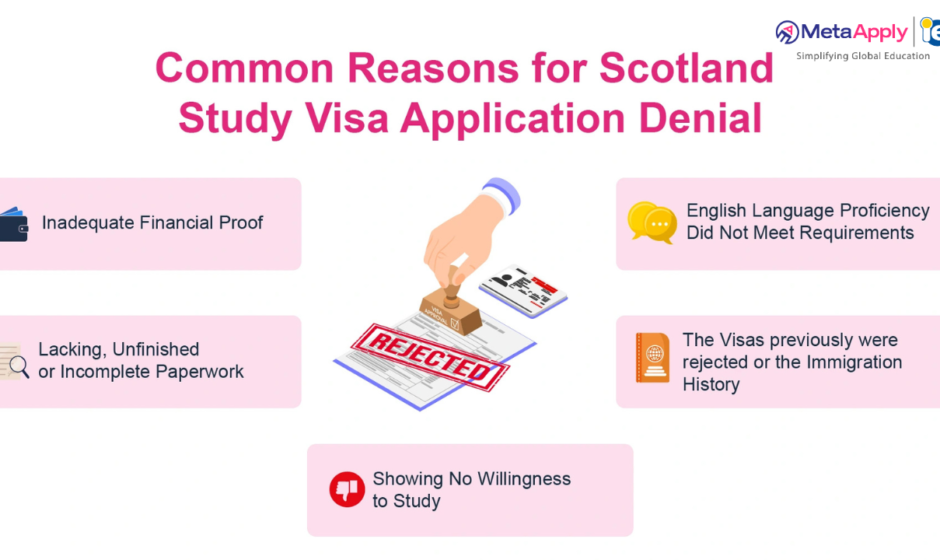Scotland, with its stunning landscapes, rich academic tradition, and vibrant culture, remains a top destination for international students, professionals, and travelers. However, despite its appeal, many visa applications for Scotland—processed under the UK’s visa system—are denied each year. These rejections often stem from avoidable mistakes or misunderstandings of the application process.
If you’re planning to travel, study, or work in Scotland, it’s essential to understand the common reasons behind visa denials for a Scotland Student Visa and how you can improve your chances of approval.
1. Incomplete or Inaccurate Documentation
Perhaps the most common reason for visa denial is incomplete or incorrect documentation. The UK Visas and Immigration (UKVI) department has a stringent documentation process. Any missing, forged, or incorrectly filled-out documents can result in immediate rejection.
Applicants frequently make errors such as:
-
Submitting expired bank statements or untranslated documents.
-
Failing to provide proof of accommodation or return travel tickets.
-
Omitting essential paperwork like a Confirmation of Acceptance for Studies (CAS) for student visas.
Every visa category has a specific checklist. It’s crucial to follow the latest guidelines from the UKVI website or seek professional assistance to ensure all documents are in order.
2. Lack of Genuine Intent
UK immigration officers assess whether you have a genuine purpose for your visit and whether you intend to return home after your visa expires.
For student visas, if you’re unable to clearly explain why you chose a particular course or university, or how it aligns with your long-term goals, your intent might be questioned. Similarly, tourist or visitor visa applicants must prove strong ties to their home country, like family, property ownership, or a stable job.
Red flags that indicate a lack of genuine intent include:
-
Inconsistent travel history.
-
Overstaying previous visas.
-
Vague explanations in your cover letter or visa interview.
3. Insufficient Financial Proof
Another leading reason for rejection is failing to demonstrate financial capability. The UKVI requires applicants to show they have enough funds to cover tuition (for students), living expenses, and other associated costs for their stay in Scotland.
Some common financial-related reasons for rejection are:
-
Bank statements not covering the required 28-day minimum.
-
Sudden large deposits without explanation (which appear suspicious).
-
Dependence on sponsors without supporting evidence of their financial capacity.
Your financial documents must be recent, clearly show your name, and reflect the minimum amount specified for your visa type.
4. Previous Visa Refusals or Immigration Violations
A history of visa denials or violations like overstaying or illegal work can significantly impact your current application. The UKVI examines past records when processing new applications. A consistent immigration history with valid reasons for any past refusals must be documented and explained honestly.
If you’ve had a previous visa denied, failing to disclose it or misrepresenting the reason can result in a 10-year ban from entering the UK.
5. Poor Academic Records or Language Proficiency (For Students)
For international students, demonstrating academic preparedness and English proficiency is mandatory. Incomplete transcripts, low academic scores, or failure to meet the English language requirements like IELTS or TOEFL scores can lead to denial.
In cases where universities have waived language tests, it is still recommended to include some proof of language proficiency, such as:
-
A Medium of Instruction (MOI) certificate.
-
A university admission letter confirming the waiver.
6. Errors in the Application Form
It might sound minor, but mistakes in the visa application form are surprisingly common. Applicants sometimes submit wrong passport numbers, mismatched names, or overlook mandatory fields. These simple errors may trigger suspicion or cause outright rejection.
Always double-check your application before submission. Using professional services can ensure your form is filled out accurately and aligns with your supporting documents.
7. Inadequate Interview Preparation
For certain visa types, especially Tier 4 (Student) visas, applicants might be called for a credibility interview. This is to confirm whether your intent to study in the UK is genuine.
Questions may include:
-
Why have you chosen this course?
-
Why Scotland?
-
How will the course benefit your future?
-
Who is funding your studies?
Failure to answer these confidently and convincingly can result in a visa refusal, even if all documents are perfect.
How to Avoid Scotland Visa Rejections
To reduce the chances of visa denial:
-
Follow the official UKVI guidelines meticulously.
-
Provide genuine, verifiable documentation.
-
Demonstrate strong home ties and clear intent.
-
Prepare thoroughly for any interviews.
-
Avoid rushed or last-minute applications.
Final Thoughts: Let MetaApply Be Your Guide
Navigating the visa process can be overwhelming, especially with changing immigration policies and complex documentation requirements. That’s where expert support becomes crucial.
MetaApply IE, a trusted name in global education services, specializes in guiding students and travelers through every step of the Scotland visa journey. From document checks to visa interview preparation, MetaApply’s team ensures that your application is not only complete but compelling. Their experience and personalized approach have helped thousands of students achieve their dream of studying abroad without unnecessary hurdles.
If Scotland is your destination, let MetaApply help you get there—smoothly, confidently, and successfully.
Read more: Hungary Student Visa



